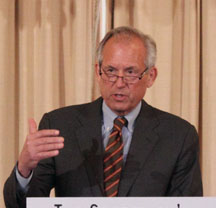A Quote by Pat Summitt
Accountability is essential to personal growth, as well as team growth. How can you improve if you're never wrong? If you don't admit a mistake and take responsibility for it, you're bound to make the same one again.
Related Quotes
I advise other companies' CEOs, don't fall into the trap where you go, 'Where's the growth? Where's the growth?' Where's the growth?' They feel a tremendous pressure to grow. Well, sometimes you can't grow. Sometimes you don't want to grow. In certain businesses, growth means you either take on bad clients, excess risk, or too much leverage.
One of the great drivers of the alienation that has made Donald Trump possible is that the growth in the American economy has been weak. In the decade from 2005 to 2015, there was not one year when the US hit three per cent growth. And to the extent there's been growth, virtually all of it has been collected by the top 10 per cent of the population. Obviously, if we knew how to make growth faster, we would. We don't. And it's very difficult to make growth more broadly shared. Because it's not just the US that has this problem.
Capitalism with near-full employment was an impressive spectacle. But a growth in wealth is not at all the same thing as reducing poverty. A universal paean was raised in praise of growth. Growth was going to solve all problems. No need to bother about poverty. Growth will lift up the bottom and poverty will disappear without any need to pay attention to it. The economists, who should have known better, fell in with the same cry.
In general, the questions that are on our mind are the same questions that have been driving our work over the past decade. How do we bring order to this messy, unpredictable world of innovation? How can we dramatically improve the chances of creating a successful new-growth business? How can we do this again and again? More specifically, it has become very clear that the fundamental paradigms of market segmentation and branding are badly broken - and we're working on developing more useful theories for these dimensions of innovation.




































